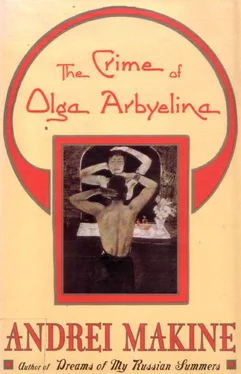One day, vexed by the dullness of a landscape on her easel, she paints stripes across it savagely with a brush and a painter friend of hers speaks jokingly of "Stripeism." For several weeks she finds herself at the head of a new artistic movement. Until the same joker covers a portrait with curves and, in his turn, launches "Curvism."…
She thinks she has learned all the rules of the game called "life." Two years earlier Li was just starting at medical school. "So that's her compensation as a daughter of poor parents," Olga had thought with a smile and, knowing the rules of the game, began to wait for some ludicrous twist. It came with the war: Li abandoned her studies and, with a nurse's satchel on her shoulder, plunged into the mud of the trenches.
As for the young horseman all covered in petals from the apple trees, one autumn day she will learn of his death and will try to gauge whether her own indifference is real or simulated. So often all their emotions had been a fraud… Irresolute, she will then start singing a German song, which, if there were any justice in heaven, should have brought the sky down on her head. The sky does not fall. Only a shower of freshly printed tracts thrown by someone from the roof. She will pick one up as she goes out. "Seizure of power. Peace Declared. Revolution," she will read distractedly. And she will heave a sigh: "Another one…" She will even smile: to learn that the war is over on the same day as learning of the death of that horseman of long ago will seem to her to conform perfectly to the pitiless mischief of life. The mocking voice within her will be roused and whisper, "It'll make a good masque for this evening-a dance before an open coffin!"
And she will weep all the same, for long hours, amazed herself at the abundance of her tears and the depth of feeling in them. But it will be too late.
Too late; for suddenly History seems to have had enough of their disguises and their pretensions to changing its course, accelerating its onward march. History or, quite simply, life lumbers into action like a great wild beast roused from a deep sleep and, in a monstrous pendulum swing of its mighty forces, begins to crush all these capricious, neurotic manikins embroiled in their sterile reflections. The People, whose name they had a habit of invoking between two glasses of champagne, between two stanzas, suddenly reveal themselves in the guise of a huge sailor from the Baltic, who breaks down their doors with the butt of his rifle; plunges his bayonet into their guts; rapes their wives; stifles the squeals of their children beneath his hobnailed boots. And walks out satisfied, enriched, smiling and proud, for he sniffs the wind of History. It is difficult not to fall under the spell of its elemental power…
There are some who are beguiled and disguise themselves yet again, imitating the wind of History in their costume. Others flee, also in disguise. The head of the government removes his "People's friend" cap, slips into a nurse's dress, and escapes from the palace that has very nearly become his tomb. And the masquerade continues. Those who used to dress up as beggars at costume balls in the old days now beg, swathed in rags. Those who played at being ghosts or bats now hide in lofts, listening for the sound of hobnailed boots. Those who wore the executioner's hood now become executioners, or, more often, victims… Later on, at the time of the exodus, Olga will learn that one of their footmen, now an important personage, has tortured and shot hundreds. "No doubt the very man," she conjectures, "who helped himself to a drink from a guest's glass. He wouldn't be able to pardon his masters for that…" And the man she surprised coupling with a bat woman, the one who was so fond of talking about the People, will escape by disguising himself as a peasant and growing a long beard…
History will far exceed their dreams. Its onward march will change from fast to furious. The mortal poisons of existence once evoked in their poems will now have the humdrum and bitter taste of hunger and continual petty terror, sticky with sweat. As for that equality, whose name was so often invoked on the terrace of the house at Ostrov, they will now taste it complete-in the endless tide of refugees, streaming from town to town, toward the south, toward the void of exile.
At one of these staging posts in a little unknown town, its streets riddled with chaotic rifle fire, she takes refuge in a great izba that astonishes her with the cleanliness and calm of its rooms, where one can hear the sleepy ticking of a clock and the quiet creak of footsteps on floorboards. Suddenly the door, held fast by a heavy hook, begins to rattle beneath violent jolting. The hook gives way. The figure that appears in the doorway looks like a woman of gigantic stature. On account of all the disparate garments it is wearing, in particular the fur coat, a woman's coat, unbuttoned, because too narrow across the shoulders. Beneath the coat several layers of blouses, one of them trimmed with lace. It is one of the soldiers who were shooting in the street a few minutes ago… He catches her at the back of the house. His drunken eyes focus on a medallion under the collar he has just ripped with his hand. He tears it off with its little chain, stuffs it into his pocket, and freezes for a moment, as if undecided, looking at her with an offended air. She is astonished at the dull feebleness of the cry that her lungs manage to squeeze out. In a second her body is overwhelmed, split in two, pinned to the floor by a heavily writhing mass. For months she has heard the threats of the victorious soldiers. "We'll rip your guts out and hang you in them!" The picture conjured up by this one haunted her especially… Now the burning pain in her loins seems almost derisory compared with the tortures she had feared. She suffers more from the acid stench of the copper cross that swings out from her violator's ginger chest hair and which she can feel dangling on her lips. And also from the bitter stench of the great dirty body. Despite this breath suffocating her she is suddenly aware of a rapid footstep and out of the corner of her eye she has time to glimpse a knee touching the ground. A revolver shot fills her head with muffled deafness, makes her screw up her eyes. The only sensation she is still aware of is the slow softening of the hardened flesh thrust into her belly… And the thick trickle that begins to ooze onto her cheek from the soldier's temple. The enormous body becomes heavier still and finally releases her as it slips sideways, an inert mass. She takes refuge in another room. The sensation of a tensed member growing slack deep down within her imprints itself on her flesh… As she passes back through the house she sees her blood-soaked footprints. Out in the yard a man, a real giant with the dark eyes of an Oriental, signals to her to wait. The shooting slowly becomes more distant. The man's clothes are little different from the trappings of the soldier he has just killed. He stares at her and almost smiles. "Prince Arbyelin," he murmurs, inclining his head before disappearing in the direction of the gunshots. She does not know if she has heard him. Her body is still reliving the death of the other man's flesh inside her. "That was your first love!" whispers a mocking voice in her thoughts. "That little bitch!" She suddenly finds this name for it and all at once feels aged… Her pain is quickly dissipated by other pains…
At Kiev, where she spends several weeks hidden in a basement filled with water up to her ankles, she learns of her cousin's death. After the reds have been driven out of the city, but only for a time, the relatives of the victims make their way to the place of execution. It is the courtyard of the former school. Up to the height of a man the walls are covered in a thick layer of dried blood, fragments of brain, shreds of skin with tufts of hair. Blood, black, stagnates in the gutter… Later, when she is capable of thought again, the memory comes back to her of the poems that spoke of the "curse of princes." Now the hemophiliac's blood, the source of so many sorrowful verses, is mingled with the pulp of all these anonymous bloods in a gutter blocked with scraps of flesh.
Читать дальше












